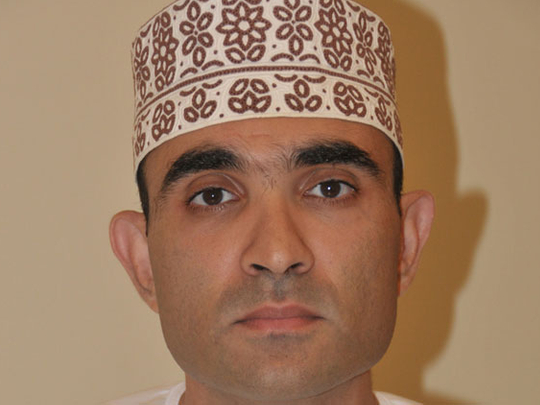
Muscat: The genesis of Oman's sit-ins was not in what happened in Tunisia and Egypt but in issues of transparency inside the country, according to an analyst.
The Arab Spring only energised the protests, added Raid Zuhair Al Jamali, a respected name among Netizens for his in-depth knowledge and analysis of the country's situation.
"The root of protests in the country was in the civil liberty and transparency issues, such as in the case of blogger Ali Zuwaidi," Al Jamali told Gulf News in an exclusive interview at his office in Muscat.
He pointed out that the role of old media in the country was to serve the state.
"Certain dialogues or narratives always got suppressed," he said, adding that it was different now in the new open age of the internet.
"The internet, which is open and global, is the new social reality and Ali Zuwaidi's case is one of its consequences," he felt.
Zuwaidi was slapped with a case by the then chief of Omantel for writing against him on a local internet forum. He also faced another case for putting classified government documents on the internet.
Al Jamali pointed out that this happened in the new age of transparency on the internet.
"It [internet transparency] took 10 years in the making, not only in Oman but worldwide — that's why you have WikiLeaks," said Al Jamali, who publicised WikiLeaks cables on Oman through social media websites recently.
Al Jamali said besides the Zuwaidi case there were specific instances such as the one in Dhofar where Eid Al Adha prayer dates were changed, where people felt the total lack of transparency.
In his opinion the internet brought to the surface the pent-up frustration of the people.
"Things were simmering for the past three to four years but due to a media blackout people were not really aware, the community was not politicised," he said.
When everything started to come to the surface, people raised their voice, he reckoned.
The protests in Oman from the start were generally peaceful but Sohar erupted in violence and two lives were lost in police action.
In Al Jamali's assessment, the violent protests in Sohar were the direct result of youth anger. "The protests, especially the violence, were perpetrated by teenaged school dropouts," he said and added that girls in Sohar are more educated than boys and when it came to filling up expanding vacancies as the area industrialised, most Sohar youngsters were not skilled to take up the jobs.
"The skilled Omani workforce required was not available in Sohar, so where did they come from? They came from other areas," said Al Jamali, and added that this too created tension.
"The young people in Sohar started complaining that all the chances were being taken up by the outsiders."
"There was money but it was not trickling down to where it should have — and all the development was too fast for the social setting of that area," he felt.
"I am no social scientist but I think the anger within turned to protests in Sohar, somewhat violent at least in some pockets," he reiterated.
According to him, people, mostly the literati, who had taken up discussions on constitutional monarchy on internet forums were behind protests outside the Shura building in Muscat.
Al Jamali said the Oman government's response set it apart from the rest of the Arab world.
"The response was quite attuned," he said, pointing to the government agreeing on Islamic banking, raising salaries, creating more jobs, sacking ministers and giving more powers to Shura.
He said Oman had experience of the Dhofar rebellion of the seventies so the crackdown was also restrained. "After the May crackdown, the government started the soft approach."
He reckons that now Oman is going the Bahrain and Kuwait way. "You will have a vibrant civil society that will start to speak out, start asking questions," he predicted.
But the sceptical, erudite Omani wants to wait and see the results. "Are changes in the Shura and State Council genuine?" he wondered.
In the next breath he replied with a smile: "The proof of the pudding is in the eating; we have to wait."
"There's a potential, and I leave it at potential — it can go either way," he cautioned.
At the same time he is elated that democracy, once a taboo word here, is being freely used in the local media. "Even His Majesty used it in his last speech," he pointed out.
He wants a level playing field for the civil society in the country and urged the media to bring out the relevant issues.
"Do not underestimate protests, it was a [big] step," he warned.












